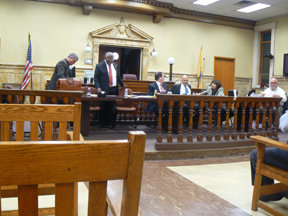The city held a public hearing on the proposed $101 million 2010-2011 Union City budget this past Tuesday, but no one from the public came out to comment. The budget, which includes a 3 percent increase in the tax rate, covers spending from this past July through next June.
Tuesday’s meeting was a chance for members of the public to give suggestions or ask questions about the budget – but the audience was small. The meeting was adjourned in less than 10 minutes.
The Union City Board of Commissioners will hold a final vote at some point in the future. They had voted to introduce the budget at an Oct. 18 meeting.
Stack said that City Hall staff has been reduced.
________
The city budget only influences part of residents’ tax bill. Residents pay a quarterly rate that comes from the city budget, the county budget (which was passed during the summer) and the school budget (which was passed last spring). Those other budgets can lead to further tax increases or decreases in the overall bill.
Mayor Brian Stack said during Tuesday’s hearing that the tax increase is due to a reduction in state aid. To compensate, he said, the city has aggressively sought grants and has been working on additional state aid.
Voting on the budget
On Wednesday, Mayor Stack attributed the lack of public comments not to citywide apathy but rather the nature of communication within the city. Residents, he said, enjoy a direct line of communication with City Hall, and have taken advantage of his publicized cell phone number. Through these open channels, Stack said residents were kept abreast of the process and, in turn, their comments were used every step of the way.
“I think us keeping them updated [on the budget process] has been very helpful,” he said.
Practicing fiscal conservatism
The biggest budget expenditure is public safety programs.
Last week, city spokesman Mark Albiez attributed any budget increases to “cost drivers outside the control of the city,” referring to the North Hudson Regional Fire and Rescue squad, which is the fire department for five local towns. Each town pays several million dollars per year.
On Tuesday, Stack referenced several measures by the city to cut back spending in the Police Department. The positions of deputy chief and inspector have been abolished, he said, and there are now only four captains and eight lieutenants.
Overall, the city has reduced its employee payroll (including police and City Hall employees) by $2.4 million, he said.
Albiez said last week that after employees retire, the city tries to replace them with part-time employees. This practice decreases salary expenditures and eliminates payment for employee health care benefits.
Stack extended thanks to city employees “who have worked with us to keep spending down.”
Stack also noted at the meeting that the city commissioners do not accept city vehicles, gas, or cell phones, as they do in some towns.
Improvements abound
Commissioner Christopher Irizarry said Union City had more problems before the current administration.
“We’ve had, in the past, administrations [that] sold assets to have nonrecurring debt. We were at a point in Union City where we had no toilet paper in City Hall,” he said.
By practicing fiscal conservatism for the past 10 years, he said, the municipality has been able to grow, improve parks, and fix infrastructure despite the state of the economy.
According to Stack, city parks are “state of the art” and “the streets have probably never been cleaner in Union City.” He attributed these improvements to the work of city employees.
Meanwhile, the budgets of nearby municipalities have skyrocketed, said Commissioner Lucio Fernandez.
Last week, Albiez compared the slight budget increase to other municipalities, such as Jersey City, noting that Union City’s is significantly less.
Deanna Cullen can be reached at dcullen@hudsonreporter.com.
